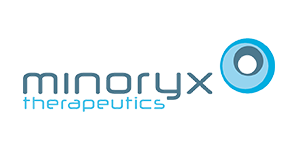
Initial evidence of disease stabilization was demonstrated for all patients using radiological, clinical and plasma biomarker assessments at 6 months (24 weeks) of treatment
Mataró, Barcelona, Spain, April 25, 2023 – Minoryx Therapeutics, a registration stage biotech company focused on the development of therapies for orphan central nervous system (CNS) disorders, today announces 24-week interim results from NEXUS. This open label registrationenabling clinical trial is assessing the safety and efficacy of lead candidate leriglitazone, a novel, brain-penetrant and selective PPAR gamma agonist, to treat paediatric patients with cerebral adrenoleukodystrophy (cALD) – a phenotype of X-linked adrenoleukodystrophy (X-ALD). The results will be presented at the American Academy of Neurology 2023 Annual Meeting. 1
The 24-week interim data supports the use of leriglitazone to treat pediatric patients with progressive cALD, a rapidly fatal neurodegenerative phenotype of X-linked Adrenoleukodystrophy characterized by inflammatory brain demyelination. After 24 weeks of treatment, all evaluable patients were clinically stable and radiologically demonstrated disease arrest or lesion growth stabilization. Consequently, the pre-defined continuation criteria for the trial were met. So far, radiological changes assessed by Loes score (LS) were similar to those attained with Hematopoietic Stem-Cell Transplantation (HSCT)-based therapies (showing either no change or minimal growth with plateauing at week 24), and plasma levels of neurofilament light trended towards stabilization paralleling results on lesion volume. Leriglitazone was well tolerated in all patients, there were no treatment related serious adverse events nor discontinuations from adverse events. Confirmatory assessment of disease arrest will be performed after 96 weeks of treatment.
For pediatric patients with cALD, allogeneic HSCT and the FDA-approved eli-cel are the only currently available treatments, however some patients are not eligible for these transplantbased therapeutic approaches or suitable donors may not be available. Additionally, whilst HSCT may halt disease progression, there is an unmet need for less invasive therapies that can be administered immediately upon lesion identification.
“Allogeneic stem-cell transplantation (HSCT) may halt disease progression, but is limited by a lack of suitable donors, regionally-restricted access, a several month time delay from cALD diagnosis to infusion, engraftment failure and severe side effects. There is an unmet need for less invasive treatments that can be administered at the moment lesions are identified, notably now that newborn screening opens the window for earlier disease rescue treatments,” said Patricia Musolino, Global Principal Investigator of Nexus, and she added: “Our interim analysis shows early changes to the natural history of cALD in boys treated with leriglitazone; lesions underwent slower growth than untreated lesions and more akin to that of lesions typically treated with HSCT in cALD. We found signals of this effect in both neuroimaging and serum biomarkers. These promising results will be need to be confirmed by clinical benefit of leriglitazone at week 96.”
“Minoryx is highly committed to bring therapeutic options to X-ALD patients – a devastating orphan disease with a major unmet medical need,” said Marc Martinell, CEO, Minoryx. “The NEXUS data adds to results from ADVANCE showing the potential of leriglitazone in reducing the progression of cerebral lesions in X-ALD patients, overall supporting its use in patients with cALD. Leriglitazone could become an important complementary tool for the management of this population.”
“Today’s announcement on the potential of leriglitazone in reducing the progression of cerebral lesions is an important step forward in the development of this exciting therapy. As the exclusive licensee in Europe, Neuraxpharm looks forward to continuing to work with Minoryx as they progress through the clinical program of leriglitazone, so that we can bring relief to patients in Europe that suffer from this rare and devastating disease,” said Dr. Jörg-Thomas Dierks, CEO, Neuraxpharm.
The NEXUS trial has enrolled 20 boys between 2 and 12 years old with cALD with brain lesions with or without gadolinium-enhancement. The 24-week interim analysis was pre-designed to be performed when up to 13 patients were enrolled and reached week 24. At the data cut-off, 16 patients had been enrolled; 11 patients were evaluable with week 24 data of whom 5 had non-gadolinium enhancing brain lesions (population 1) and 6 had gadolinium-enhancing lesions (population 2); 2 patients discontinued early because they received allogenic HSCT or autologous HSCT although protocol specific HSCT criteria were not met for both patients; and 3 patients have not yet reached week 24. Continuation criteria for the trial were met: all 11 evaluable patients demonstrated lesion growth deceleration or disease arrest (95% confidence interval [CI]: 71.5, 100). The lower limit of the 95% CI was well above the prespecified threshold of 10%, thus a sufficient number of subjects met the criteria to support continuation of the study. All patients remained clinically stable (free of Major Functional Disability (MFD) and stable Neurological Functional Score ≤1 (NFS)). Five patients had arrested disease (45.5%, 95% CI: 16.7–76.6%). Lesion growth was determined by central readers who assessed the MRI images and provided an expert assessment of lesion growth based on volumetrics and published natural history data. Lesion growth for all 11 evaluable subjects at week 24 was assessed as either stable with no growth or growth below that expected based on natural history data. Neurofilament light chain concentrations stabilized in most patients following a parallel profile to lesion volume change. Matrix metalloproteinase-9 concentrations decreased in all patients. There were no treatment-related serious adverse events.
Leriglitazone has been granted orphan drug status for X-ALD from the FDA and the EMA and fast track and rare pediatric disease designation from the FDA for the treatment of X-ALD.
1 Abstract number 1159 entitled “Interim Results from the NEXUS Open-Label Phase 2 Study on the Safety and Efficacy of Leriglitazone in the Treatment of Childhood Cerebral Adrenoleukodystrophy” accepted as an oral and poster presentation. This abstract will be presented in-person at the Annual Meeting at the Boston Convention and Exhibition Center. The oral presentation will take place during ES2: Emerging Science 2 on Tuesday, April 25 from 5:36 p.m. to 5:42 p.m. The poster is in this same session, poster number is 002.
About NEXUS
NEXUS is a 96-week, open-label, multicenter study for European registration (NEXUS; NCT04528706) of once-daily oral leriglitazone. The study NEXUS so far enrolled 20 patients, and enrollment closes by the end of April 2023. Final results are expected in the second half of 2025 when the last patient will have completed 96-week treatment. The primary endpoint is the proportion of patients with clinically and radiologically arrested disease at week 96 (success criteria: one-sided 95% [CI] > 10%). Secondary endpoints include change from baseline in NFS and Loes score (LS). Change from baseline in lesion volume and plasma biomarker concentrations are exploratory endpoints.
About leriglitazone
Leriglitazone (MIN-102) is Minoryx’s novel orally bioavailable and selective PPARγ agonist with a potential first-in-class and best-in-class profile for CNS diseases. It has demonstrated brain penetration and a favorable safety profile. It has shown robust preclinical proof-of-concept in animal models of multiple diseases by modulating pathways leading to mitochondrial dysfunction, oxidative stress, neuroinflammation, demyelination and axonal degeneration. In clinical trials, leriglitazone showed clinical benefit both for X-ALD and Friedreich’s Ataxia patients. Neuraxpharm, a leading CNS specialist, has licensed the rights to leriglitazone in Europe and Sperogenix has licensed the rights to China.
About X-ALD
X-ALD (X-linked adrenoleukodystrophy) is an orphan neurodegenerative disease. The global incidence of X-ALD is approximately 6-8/100,000 live births. All X-ALD patients reaching adulthood develop adrenomyeloneuropathy (AMN), characterized by progressive spastic paraparesis, as well as progressive deterioration of balance and sensory function, and development of incontinence. This form progresses chronically with onset of symptoms typically in adulthood, affecting both men and women, and has poor prognosis. About one third of all male X-ALD patients will develop cerebral ALD (cALD) between 4-8 years of age, while another third will develop cALD during adulthood. cALD is characterized by aggressive brain inflammation with patients progressing quickly with severe neurological impairment, often leading to permanent disability and death within 3-4 years. There is currently no pharmacological treatment available for X-ALD. In childhood, hematopoietic stem cell transplantation (HSCT) can arrest the disease, however, it is an aggressive procedure and only available for a portion of patients; autologous HSCT is not globally available; this still requires hemo-ablation therapy with associated comorbidities and long-term safety data is being gathered. In adults, experience in HSCT is very limited and the intervention is often not recommended.
About Minoryx
Minoryx is a registration stage biotech company focusing on the development of novel therapies for orphan CNS diseases with high unmet medical needs. The company’s lead program, leriglitazone (MIN-102), a novel, brain penetrant and selective PPAR gamma agonist, is being developed in X-linked Adrenoleukodystrophy (X-ALD) and other orphan CNS diseases. The company is backed by a syndicate of experienced investors, which includes Columbus Venture Partners, CDTI Innvierte, Caixa Capital Risc, Fund+, Ysios Capital, Roche Venture Fund, Kurma Partners, Chiesi Ventures, S.R.I.W, Idinvest Partners / Eurazeo, SFPI-FPIM, HealthEquity, Sambrinvest and Herrecha, and has support from a network of other organizations. Minoryx was founded in 2011, is headquartered in Spain with Belgian facilities and has so far raised more than €120 million.
For more information, please visit www.minoryx.com.
Contact Information:
Image Box Communications
Neil Hunter / Michelle Boxall
Tel +44 (0)20 8943 4685
minoryx@ibcomms.agency
